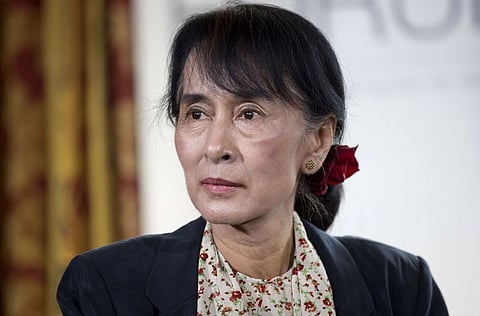Myanmar: The military jails its famous ally
Muted reaction to Aung San Suu Kyi’s jailing, who stood by army’s Rohingya cleansing

A court in Myanmar on Monday sentenced Aung San Suu Kyi, the Nobel laureate politician and once pro-democracy activist, to four years in prison on charges of inciting violence and “violating Covid-19 rules”, in a move that analysts said will deal a significant blow to international efforts to return civil rule to the military-administered country.
The military seized power on February 1, ousting the civilian government and arresting its leader, the 76-year-old Suu Kyi. In the 10 months since the coup, international agencies say, more than 1,300 people have been killed and thousands of others arrested.
The arrest of Suu Kyi and other top officials close to her came in the predawn raids on February 1 to end a 10-year experiment with democracy in Myanmar, which had been ruled by the military for 50 years. The military took over in February after it said the November 2020 elections was rigged to give Suu Kyi’s National League for Democracy (NLD) party an absolute majority in parliament.
Monday’s court ruling is the first of several expected against Suu Kyi who faces 11 charges in total, including for corruption and the sharing of state secrets. If found guilty, sources say, she may be sentenced to nearly 100 years in prison.
A steep climbdown
Suu Kyi was for decades seen worldwide as the ultimate democracy and human rights advocate. She won the Nobel Peace Prize in 1991 in recognition for her long fight against the military rule in her country and her human rights work. In the 10 years that followed, she was awarded at least 10 internationally prestigious awards for her advocacy including the famed Sakharov Prize, the US Presidential Medal of Freedom and the International Simón Bolívar Prize.
The world cheered when she was finally able to lead her country in 2011 following the introduction of democracy that year, sharing power with the powerful military.
However, many in the West realised that their long-held reverence of Suu Kyi was actually misplaced when she supported the military’s cleansing campaign against the Rohingya in 2016, which drove more than 700,000 of the Muslim ethnic minority into refugee camps across the border in Bangladesh.
To the shock of the world, she even flew to The Hague in 2019 to defend the military against charges of genocide. In other words, she was complicit in the ethnic cleansing of that vulnerable minority.
Her position led critics to conclude that her democratic values were selective and discriminatory. That also led to calls and even petitions across the world to revoke her Nobel Prize. That also explains the largely muted reaction to her sentence by the military court on Monday. Few expect that the West will this time go the extra mile to pressure the military to release her.
Suu Kyi’s jailing is wrong and unfortunate. But she should have known better. She should not also expect the poor Rohingya to shed any tears for her.







